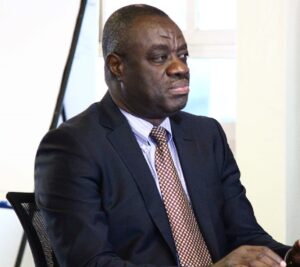Tourism is an outstanding, multi-million dollar, multi-sectoral and holistic universal industry which is founded on man-made, natural, cultural and heritage resources. It is also very sensitive, dynamic, resilient and competitive industry, which additionally has very huge influence and impact on both developed and developing economies across the globe – individually and collectively. It saw and registered consistent, sustained and improved phenomenal growth in both visitor numbers and receipts since the turn of the millennium, and stood out as the discovery of the millennium until the outbreak of COVID-19 pandemic, which brought the high flying industry to its lowest knees.
Rebound
Tourism is a proven highly resilient industry that has stood the test of time over the years, it survives man-made and or natural disaster disruptions to rebound bigger and better; and the post pandemic rebound signs are very visible as the industry returns to gradual growth across the world.
Ghana’s tourism development journey
Ghana, in the 80s, experienced unbearable economic stress as a fall-out from severe drought and famine; increased indiscriminate, unplanned and uncontrolled population growth; scarcity of foreign exchange; and basic household and domestic commodities as well as forced mass repatriations of millions of Ghanaian migrants from Nigeria. All these, combined, resulted in severe national socio-economic stress and hardship, which forcefully re-stressed the need for socio-economic diversification, expansion, modernisation and improvement.
Research & studies
The country sponsored and commissioned series of public research and studies into several alternative and suitable sectors and industries with the wherewithal and the capacity to support socio-economic expansion and modernisation. Sectors which came up included industrialisation, agro-processing, aquaculture, tourism, commercial irrigation, mix-farming, mix-cropping, livestock farming, among others.
Tourism came tops & handy
Ghanaians are very warm and hospitable to strangers from all walks of life. Warm hospitality is, therefore, a national pride and trait that is never in doubt. The many ethnic groups and tribes which make up the Ghanaian society have rich, attractive and diverse cultural practices, including the cultural festivals, food, clothing, language, wildlife, among others. Additionally, the countryside, especially the coastal areas, have many colonisation and historic colonial landmarks, including castles and forts, which continue to attract interest among African-Americans and others Africans in the Diaspora, mission and missionary schools and churches, among other outstanding historic landmarks. With peerless national heritage wealth which remain unexplored and untapped, the tourism sector therefore came up strongly and tops among all the examined and analysed alternatives with suitable capacity for socio-economic expansion, diversification, modernisation and improvement.
PNDCL 1990, 238 & NCC
The erstwhile PNDC Government promulgated the famous PNDCL 238, 1990 which created and established the National Commission on Culture (NCC), a body corporate and a statutory institution that has the mandate for the cultural sub-sector.
EI1993 & MoT
The first government of the Fourth Republic, under the leadership of the late President Jerry John Rawlings, gave national tourism the needed structure, crucial push and energy and/or resources with Executive Instrument 1993 (EI93) to create the erstwhile Ministry of Tourism (MoT) in 1993. The EI93 was a very significant and important milestone in our national tourism development narrative.
The EI93 gave the tourism sector and industry the needed autonomy, which was hitherto clamped and treated as footnote to other important and demanding sectors like information, culture, among others.
Re-designation & realignment
The ministry underwent several re-designations, re-alignments, re-brandings and expansions, and known differently at various points in time – including the Ministry of Tourism and Modernisation of the Capital City (MOT&MCC), Ministry of Tourism and Diasporan Relations (MOTDR), Ministry of Tourism, Culture and Creative Arts (MOTCCA) – and currently stands as Ministry of Tourism, Arts and Culture (MOTAC).

1996-2010 National Tourism Development Blueprint
MOTAC and its predecessors, in 1996 during the reign of the late Mrs. Vida Amadi Yeboah as Minister of Tourism and Member of Parliament (MP) for Akwapim, mobilised resources and drafted the historic 1996-2010, 1st (15-year) Long-term National Tourism Development (NTD) Blueprint. The historic document spelt out a comprehensive action plan for strategic national tourism development to, among other things, holistically and systematically harness the national tourism potential and resources to ultimately transform and reposition the country into prominence as an attractive and competitive international tourism traffic hub.

Experience
Ghana has, thus, initiated and implemented sustained cutting-edge national tourism development policies and projects from 1993 to date, which have repositioned the country as an emerging new destination with flourishing infant tourism industry, which has also seen growth in lips and bounds, specifically with improved annual growth in both visitors’ numbers and receipts.
Challenges
A number of challenges exist and have impeded Ghana’s accelerated tourism development progress over the years. Notable among these challenges are:
Poor funding & budgetary allocation
Tourism, as a universal industry, is very a competitive and capital-intensive industry, and countries which want to remain tourism competitive, therefore, allocate adequate funds and invest handsomely in tourism development. however, Ghana’s funding and annual budgetary allocation for the tourism sector over the years remain very poor and inadequate to transform and reposition the country onto the competitive international tourism index league.
UNWTO protocols & guidelines
The United Nations World Tourism Organisation (UNWTO) is a Madrid, Spain-based UN specialist agency, which has the mandate to promote excellence in tourism development and industry evolution around the world. UNWTO has undertook and commissioned several scientific studies and research on the industry, and also developed best industry practice guidelines, protocols, rules and regulations to guide member-countries, destinations, facilities, investors and other identified stakeholders.
1:10
Notable among these protocols and guidelines is One-is-to-Ten (1:10), which identified and stated that vibrant domestic tourism industry is indispensable to any meaningful and sustainable tourism development, and hence, the refrain: ‘For every one (1) international tourist visitation to a destination, there must be ten (10) corresponding domestic touristic activities at the destination and/facility involved. Ghana has not religiously adhered to and applied UNWTO protocols and guidelines’ prescriptions in our national tourism development policies and projects over the years.
High national ignorance
There is very high national ignorance about the socio-economic benefits that are associated with tourism development.
Defects & omissions
There are noted defects and omissions on Ghana’s current national tourism development strategy. Major noted defects include:
Piece-meal strategy
Tourism is a holistic industry which is founded on man-made, natural, cultural and heritage – four (4) key broad sub-sectors. Ghana’s current national tourism development regime encompasses these four major resource divisions. The country has pursued an ‘unholistic’ tourism development regime which is hospitality, especially accommodation and catering biased, from 1993 to date.
Lack of hospitality development policy
The hospitality sub-sector, especially accommodation and catering sub-sectors, are currently Ghana’s largest national tourism cash cows, a situation which has been the trend from the 90s to date but strangely, the country does not have any national hospitality development policy.
Obsolete & duplicative legal regime
Tourism, as a holistic industry, equally demands a holistic legal framework to promote and ensure a holistic industry development and evolution, but Ghana does not have a holistic national legal framework. Currently, the tourism sector is dependent on a number of pieces of legislative instruments; notable among these are the National Museums and the Ghana Museums and Monuments Board (GMMB) Act 1969, NLCD 387; the National Commission on Culture (NCC) Law 1990, PNDCL 238; the Chieftaincy Act (CA) 2008, Act 759; and the Culture Policy and Cultural Trust Fund Policy (CP&CTFP) Document 2004. The rest are the Ghana Tourism Authority (GTA); the Tourism (T) and the Tourism Development Levy /Fund (TDL/F) Act 2011, Act 817; the Film Classification, Development, (FC&D); the National Film Authority (NFA) and Film Development Fund (FDF) Act 2016, Act 925; and the Creative Arts Agency (CAA); and Creative Arts Industry Development Fund (CAIDF) Act 2020, Act 1048 are the current relevant and applicable tourism and/or tourism sub-sector related laws that apply as far as the conduct of the tourism sector business in the Ghanaian jurisdiction is concerned.
National tourism grant
The country has benefitted from an ongoing World Bank/ IDA grant, Which has come at an opportune time to fill the funding vacuum in Ghana’s tourism development funding regime.
Way forward
Tourism is very much relevant and important to our national socio-economic transformation aspirations and needs since the industry is an outstanding, holistic, dynamic and very sensitive but resilient and competitive universal industry, which has become an integral part of many competitive economies across the world. Many tourism-conscious countries and destinations across the world adopt innovate and creative national tourism development initiatives which are regularly reviewed so as to be in tune with the trends and dynamics of society in order to remain competitive. Ghana cannot afford to be left on the international competitive tourism index. We must re-engineer and modernise our national tourism development strategy. We must also make it mandatory to regularly – say five (5) years interval – review the national tourism development strategy and legal regime to ensure our national tourism development projects and policies remain relevant, innovative and competitive.
Tourism development reforms
Fortunately, Ghana has assessed a US$40million World Bank/IDA National Tourism Grant. It is very incumbent on the Ministry of Tourism, Arts and Culture (MOTAC) to allocate a fraction of the grant for a comprehensive national tourism development reform. Notable areas which deserve priority and must be tackled in the reforms include:
Legal reforms
Legislation and legal regimes play a very crucial and critical role in the development and evolution of very competitive industries, such as tourism, trade and others.
The industry, being a holistic sector which consists of four major and broad sub-sectors, equally demands an astute and comprehensively holistic legal regime. Ghana’s current national tourism legal regime is very narrow. It is hospitality sub-sector biased – very synonymous with bits and pieces of legal enactments, most of which are duplicative with corresponding duplicating statutory body corporates, obsolete, among other palpable defects.
Notable tourism sector-related pieces of laws and body corporates include the GMMB Act 1969, NLCD 387; the NCC Law 1990, PNDCL 238; the Tourism Act 2011, Act 817; Creative Arts Act 2020, Act 1048; Ghana Museums and Monuments Board, the National Commission on Culture, Ghana Tourism Authority, National Film Authority as well as the Creative Arts Agency Act, among others.
National hospitality policy
The hospitality sub-sector, especially accommodation and catering sectors, stands tall as Ghana’s tourism sector cash cows, effective 1993 to date. However, Ghana currently has no national hospitality development legislation, legal regime or policy to consciously explore and harness the two outstanding sectors for their national socio-economic benefits. The country has clocked three decades of sustained national tourism development from 7th January, 1993 to 7th January, 2023. When we transitioned from military rule to constitutional rule and the Fourth Republic, the hospitality industry and the tourism industry as a whole have served Ghana our homeland very well. The absence and lack of National Hospitality Legislation and Development Policy are defects in our national tourism development strategy which must be addressed without further delay for rapid and accelerated national tourism progress.
New National Tourism Legislation
Ghana has thirty (30) years’ experience of sustained national tourism development, which has repositioned and rebranded the homeland as an emerging prominent and competitive international tourism traffic hub, using trial an error tourism development regime, during which MOTAC and its predecessors have generated all the needed statistics and data to usher Ghana’s national tourism journey to a new era.
The time is very appropriate to review and undertake a comprehensive overhaul and re-engineering to a new and improved scientific national tourism development narrative using the available needed and suitable data and experience.
Thematic areas of the new re-engineered national tourism development regime must first and foremost be anchored and driven by:
National UNWTO Whip
There is a need to create a well-funded, resourced and functioning National UNWTO Directorate at MOTAC to be managed by a National UNWTO Whip, whose mandate – among other duties– must include ensuring that all our national tourism development policies and projects strictly adhere to and are compliant with all basic and fundamental UNWTO best industry protocols, rules, guidelines, regulations and conventions.
Secondly, the reforms must additionally enact an all-new, holistic and balance national tourism legislation and legal regime for the homeland.
The new national tourism legislation and development strategy must consider merging fragmented pieces of tourism laws on our statues. Also, the relevant statutory institutions must be harmonised into a well-funded and resourced national tourism development commission, with accommodation and provision for man-made, natural, cultural and heritage sub-sectors.
TAs & assemblies as Statutory Tourism Custodians
The new re-engineered national tourism legislation must designate traditional authorities and district assemblies (TADAs) as statutory tourism custodians and frontline industry players across the country, which are unharnessed competitive mini-national tourism brands in their own rights.
Tourism regions, districts & circuits
Additionally, there is a need to demarcate the country into well-defined national tourism regions, districts and circuits (TRD&Cs), with various incentives, for instance taxes payable by hotels, restaurants, car rents, textiles, clothing and fashion. Industry players in Accra must be higher as compared to same businesses located in the six (6) new regional capitals, new and undeveloped, inaccessible assemblies and other rural areas across the country. The zoning and demarcation of the country into tourism regions could be the antidote to Ghana’s unattractive branding as high-cost destination.
National Tourism ID
Branding and brands (B&B) are very crucial and essential to competitive and tourism traffic hubs sustenance and survival. Ghana currently does not have nor boast any competitive national tourism brand identification. There is, therefore, a need for MOTAC to take pragmatic steps to create an attractive national tourism brand identity. The various traditional authorities and metropolitan, municipal and district assemblies (TAMMDAs) are suitable mini-brands that can readily be activated in this direction.

The Writer is a Tourism Historian, Brands & Branding, Communication & Marketing Consultant, Practitioner, Analyst, Advocate & Activist
Email:[email protected]










